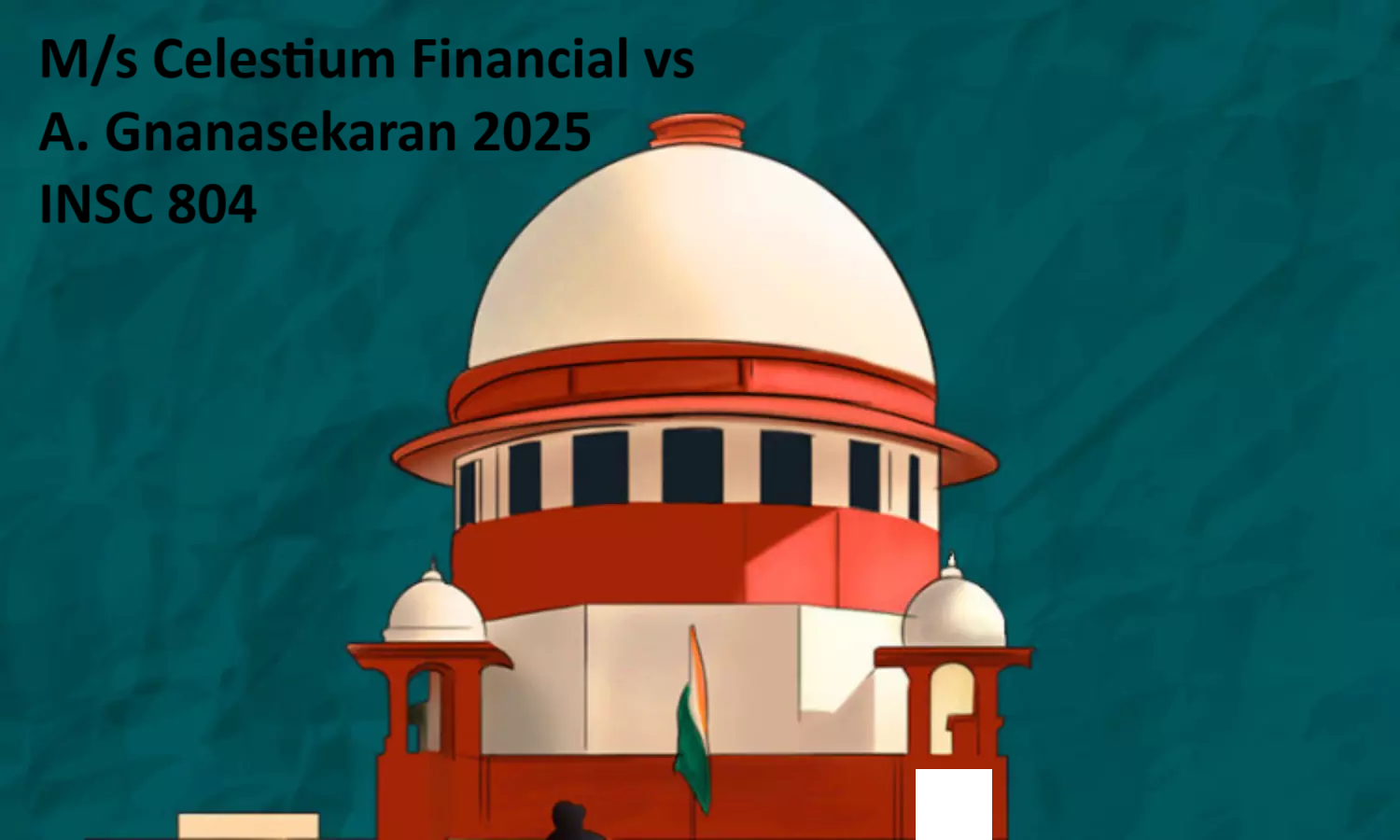M/s Celestium Financial vs A. Gnanasekaran 2025 INSC 804
M/s Celestium Financial vs A. Gnanasekaran 2025 INSC 804

M/s Celestium Financial vs A. Gnanasekaran 2025 INSC 804
Complainant in Section 138 of NI Act has the right to prefer an appeal under the proviso to Section 372 of CrPC, 1973 as a “Victim”
The case involved a complaint under Section 138 of the Negotiable Instruments Act, 1881 (NI Act), which criminalizes the dishonour of a cheque for insufficiency of funds or if it exceeds the account balance. The complainant had approached the Madras High Court seeking leave under Section 378(4) of the Code of Criminal Procedure, 1973 (CrPC) (Section 419 of the Bharatiya Nagarik Suraksha Sanhita,2023) to appeal against the acquittal of the accused. However, the High Court refused to grant such leave.
The matter was appealed before the Supreme Court, raising a significant legal question — whether a complainant in a cheque dishonour case qualifies as a “victim” under Section 2(wa) of the CrPC (Section 2(y) of the BNSS,2023) and therefore is entitled to file an appeal under the proviso to Section 372 CrPC(Section 413 of the BNSS,2023) without needing special leave under Section 378(4)of CrPC (Section 419 of BNSS, 2023).
Legal Issues:
1. Can the complainant in a Section 138 NI Act case be treated as a “victim” within the meaning of Section 2(wa) of CrPC?
2. If yes, can such a complainant directly file an appeal against acquittal under the proviso to Section 372 of CrPC (Section 413 of the BNSS,2023) without invoking Section 378(4) of CrPC (Section 419 of BNSS, 2023).?
3. Is the accused in a Section 138 NI Act case considered a person “charged with an offence” under the CrPC?
Complainant is a “Victim” Under CrPC:
The Court held that a complainant in a cheque dishonour case is indeed a “victim” under Section 2(wa) of the CrPC. The definition of “victim” includes any person who has suffered loss or injury caused by reason of an act or omission for which the accused has been charged. The Court clarified that:

1. A dishonoured cheque leads to economic loss.
2. The injury or loss is real and direct, suffered by the payee (complainant).
3. Therefore, the complainant in such cases falls squarely within the ambit of “victim.”
The Court emphasized that the definition of "victim" is inclusive and purposive, enabling even private complainants in cheque dishonour cases to claim rights under the CrPC, particularly the right to appeal.
Right to Appeal Under Proviso to Section 372 of CrPC(Section 413 of the Bharatiya Nagarik Suraksha Sanhita,2023) :
The proviso to Section 372 of CrPC, (Section 413 of the BNSS,2023) inserted by the 2009 amendment, allows a victim to file an appeal against: An order of acquittal, Conviction for a lesser offence, Inadequate compensation or sentence. The Court noted that this proviso confers an independent right of appeal upon victims without needing to seek prior permission or special leave from the High Court. According to the bench, merely because the complaint is initiated under Section 200 of CrPC (Section 223 of the BNSS,2023) by the aggrieved person, the complainant does not lose his identity as a victim. In fact, in a Section 138 NI Act case, only a victim (i.e., the person to whom the cheque was issued and who suffered the dishonour) can file a complaint. Hence, the complainant can directly appeal against acquittal under the proviso to Section 372 of CrPC (Section 413 of the BNSS ,2023) , and need not seek leave under Section 378(4) of CrPC (Section 419 of the BNSS ,2023) which was traditionally required in private complaints.
Accused in a Section 138 complaint can be considered a person “charged” with an offence
The Court further addressed the question of whether the accused in a Section 138 complaint can be considered a person “charged” with an offence under CrPC. Though CrPC does not define the term “charge”, the Court referred to judicial precedents and noted that:
1. A “charge” involves a formal accusation made in a manner recognized by law.
2. Under Section 138, there exists a legal presumption of guilt once the basic facts are established (as per Sections 139 and 142 of the NI Act).
Therefore, a person proceeded against under Section 138 is deemed to be charged and tried, even if the proceeding is initiated via complaint and conducted as a summary trial under Chapter XXI CrPC. The accused, thus, meets the standard of a person charged with an offence.


